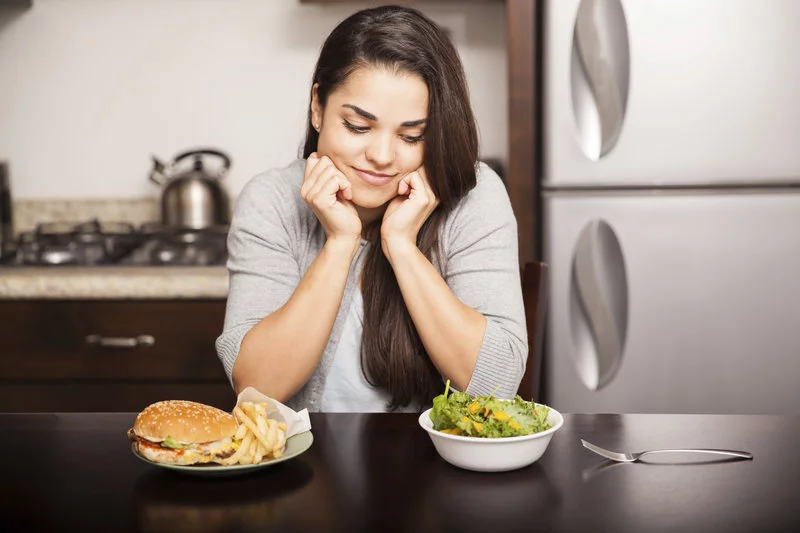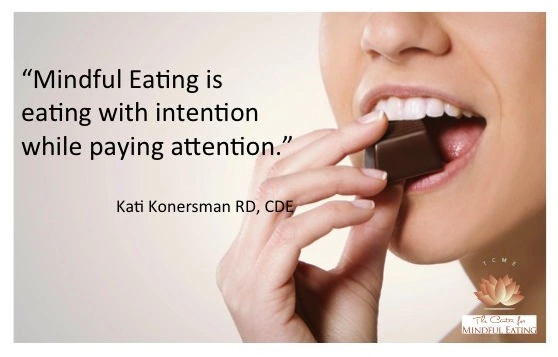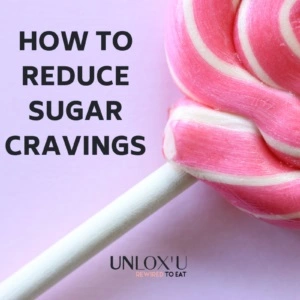Food cravings can impact all of us. We would all at some point have experienced food cravings in some shape or form throughout our lives.
Food cravings are often described as “an intense desire for a specific food.” The desire to eat a specific food can seem almost uncontrollable and can fully occupy ones thoughts until the food that the person is craving is consumed.
As individuals we will experience cravings differently, however, we often see that people have a tendency to crave foods that are highly processed and contain large amounts of sugar, fat and salt. Simple carbohydrates dramatically raise our levels of the hormone serotonin which creates an almost instant calming effect.

Food cravings are not specific to any particular time of the day, however, research does indicate that we are more susceptible to food cravings when we are experiencing periods of low energy levels. Therefore, Night Time Binges are a very common concern.
For example it is common that people will encounter low energy levels around 2pm – 3pm, and again following our evening meal.
Potential reasons for experiencing food cravings
- A meal filled with simple carbohydrates which creates a spike in blood sugar levels followed by a dramatic drop which can cause tiredness.
- Emotional Attachment to particular foods. Therefore, the craving is for a certain feeling that the food evokes. It is often memories that we associate with food.
- A drop in our core body temperature can trigger the release of melatonin which creates tiredness. When we are tired, our body craves high calorie dense foods to boost energy levels fast.
- Lack of certain nutrients and vitamins in the body.
- Dehydration- even mild dehydration has an effect on our mood and energy.
- Lack of adequate sleep. Studies show that we are more likely to consume higher energy foods, particularly foods high in sugar, when we are not getting adequate rest – this is our bodies way of trying to raise our energy levels.

Cravings can also be an indication of other things such as – frequent food restriction, hormonal changes, internal and external stress, the sight, sound and smell of a particular food can trigger us to feel that we need to consume it also, (think fast food chains and their clever marketing).
There is a tenancy to overeat when we are experiencing food cravings, particularly if an individual has restricted their food intake prior to this. This often leaves the individual in a state of emotional turmoil around their choices with a feeling of total loss of control.
Thankfully there are some basic steps we can take to reduce the feelings of food cravings, these can be both preventative measures as well as actions that one takes when they find themselves in the middle of a food craving.

Craving busting strategies:
- Move your body. Research shows that when struck by a strong desire for chocolate, a 10-minute walk can reverse the pull. I always suggest to give yourself 10 mins to move your body, dance or jump. Movement releases endorphins and reduces cortisol. Motion creates emotions – as Tony Robbins says.
- If your cravings are part of emotional eating and binge eating, it is important to look at the triggers. They can be due to restricting and dieting, poor relationship with food, imbalanced diet and blood sugar fluctuation, thoughts and beliefs or habits and routine. In this free workbook, you will be able to identify your hidden reasons for binge eating and emotional eating fast.
REVEAL HIDDEN REASONS FOR
BINGE EATING & EMOTIONAL EATING
Regain power over food!
Binge eating and emotional eating is not a food problem, it is an emotional problem.
We can’t rely on will-power to stop binge eating. In this e-book you will reveal your hidden reasons for binge eating and emotional eating and learn how to beat binge eating fast.
- Distance yourself from the craving. Similar to the above, you can also try taking a shower or going on a brisk walk to shift your mind onto something else. A change in thought and environment may help stop the craving.
- Have balanced diet – protein, fat and carbs. It’s important to eat proper meals at mealtimes. This way, your body gets the nutrients it needs and you won’t get extremely hungry right after eating. Eating more proteins will reduce your appetite and keep you from overeating. It also reduces cravings, and helps you feel full and satisfied for longer.
- Schedule sufficient sleep. Your appetite is largely affected by hormones that fluctuate throughout the day. Sleep deprivation disrupts the fluctuations, and may lead to poor appetite regulation and strong cravings.
- Follow a low glycemic load food plan. This will help you to keep your blood sugar balanced. The Glycemic Index is a relative ranking of carbohydrate in foods according to how they affect blood glucose levels. Carbohydrates with a low glycemic value (55 or less) are more slowly digested, absorbed and metabolised and cause a lower and slower rise in blood glucose and, therefore usually, insulin levels.
Low Glycemic Foods (55 or less)
- 100% stone-ground whole wheat or pumpernickel bread.
- Oatmeal (rolled or steel-cut), oat bran, muesli.
- Pasta, converted rice, barley, bulgar.
- Sweet potato, corn, yam, lima/butter beans, peas, legumes and lentils.
- Most fruits, non-starchy vegetables and carrots.

- If you find yourself in need of a snack between meals, try to combine protein and fat, such as, fruits and nuts/nut butter, vegetables hummus or cottage cheese. If 3pm is crisis time, prevent it by having a snack prepared and enjoy it approximately 60 minutes before it hits. Hunger and a lack of key nutrients can both cause certain cravings. For ideas for healthy, and protein rich snacks, download my free recipe e-books.
- Add some of your favourite foods – even chocolate and biscuits to your daily meals (maybe lunch time) and you will see your cravings for that food will ease with the time.
- Reduce stress in your life. Stress may induce food cravings and influence eating behaviours. Studies show that women under stress have been shown to eat significantly more calories and experience more cravings. Try to minimise stress in your environment with yoga, by planning ahead, meditating and generally slowing down. And if you don’t know it yet, you can now join my online body love yoga classes here
- Eat mindfully. Mindful eating teaches you to develop awareness of your eating habits, emotions, hunger, cravings and physical sensations. It helps you to distinguish between cravings and actual physical hunger so that you can choose your response, instead of acting thoughtlessly or impulsively Eating mindfully involves being present while you eat, slowing down and chewing thoroughly. It is also important to avoid distractions, like the TV or your smartphone.
- Get to the root cause of your cravings. Does your body crave nutrients or love, connection, comfort, distraction? By getting to the root cause of our cravings we can address and fill the true and real need. If we don’t, no matter how much we eat, the craving for _____ will always stay.
A craving is not your body’s way of punishing you, it is only a message. And if you would like to get to the root cause of your cravings and understand why you might be overeating and binge eating, I would like to invite you to my free training.




